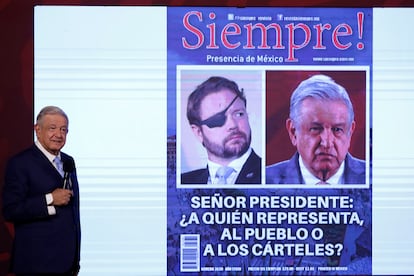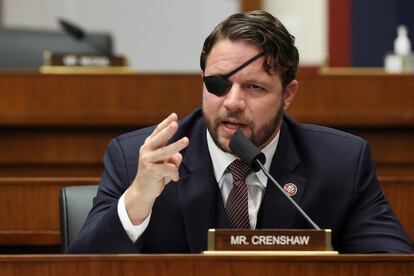Congressman Dan Crenshaw: ‘We have to fight the cartels as if they’re terrorists. They have more money than ISIS or Al-Qaeda’
The conservative Republican lawmaker — who supports ‘declaring war on the cartels’ — assures EL PAÍS that he is willing to meet with the president of Mexico and move past the verbal dispute that the two men have been engaged in for several months

U.S. Representative Dan Crenshaw, 39, is considered to be a rising star in the Republican Party. But in Mexico, the Congressman for Texas has been branded as an “interventionist” and a “wimp” by President Andrés Manuel López Obrador, who has accused Crenshaw of deploying anti-Mexican discourse to be re-elected to his seat in 2024.
Back in November, Crenshaw proposed a bill in favor of the United States “declaring war on the cartels,” treating them as terrorist groups and authorizing the use of U.S. military forces on Mexican soil. President López Obrador reminded the congressman that Mexico “isn’t a colony of the United States,” while also emphasizing that the proposal was unacceptable and in violation of international law.
Born in Scotland to American parents, Crenshaw was a member of the Navy Seals. A veteran of the wars in Iraq and Afghanistan, he lost an eye in combat. After months of online clashes with the Mexican authorities, the conservative politician requested an interview with EL PAÍS to defend his proposal and give his side of the story regarding his verbal conflict with López Obrador and the Democratic Party. “He’s not dumb,” he says about López Obrador in Spanish, which he learned after spending his youth in Ecuador and Colombia (his father was an American petroleum engineer who found work abroad). “Nobody’s saying that we’re going to invade Mexico and send in tanks.” He adds: “I’m Mexico’s greatest ally.”
At times, the Republican opts for a more conciliatory tone. He tells EL PAÍS that he will seek to meet with the Mexican president to clear up their differences, but he remains firm in his support for heavy-handed measures. He also denies that the installation of a floating wall in the Rio Grande is an inhumane act: “What’s inhumane is crossing into our country without documents.”
Below is a condensed version of our conversation with Representative Crenshaw.
Question. In Mexico, various media outlets describe you as a hard-line Republican. Are you comfortable with this label?
Answer. I don’t know what “hard-line” means. I believe that we should only take a hard line against a threat like the cartels, who are killing people — [both] Mexican and American people. I don’t think it’s a hard line to say that we have to fight them. They’ve killed thousands and thousands of Mexicans. They control parts of Mexico, they control the government in some parts of Mexico and they threaten politicians in Mexico. And for us, what has changed a lot in recent years is that the cartels aren’t only sending marijuana, cocaine and heroin. Today, they’re sending poison in the form of drugs, like fentanyl. We have to face them together. I don’t know why they describe me as part of the far-right, like in your articles. I don’t know what that means, either. We’re talking about a matter of national security for both countries.
Q. Why do you want to declare war on the drug cartels?
A. When we talk about an authorization for the use of military force, it’s only a legal step to use our military — together with the Mexican Army — to fight the cartels. In Mexico, the Ministry of National Defense (SEDENA) and the Navy are used against the cartels. The president doesn’t trust the police. There’s corruption in the police. So, if we’re going to help Mexico, it will be through a relationship between our militaries. It’s a legal step, simply so that we can cooperate with the Mexican Army, if they invite us. That’s the second step: López Obrador has to ask for help. I don’t understand why AMLO reacted like that against me. I never said that we were going to invade Mexico. That is nonsense.
I can’t believe the media, the Democrats and AMLO would say something like that. Obviously, we’re going to respect the sovereignty of Mexico. We’re going to stop the drug traffickers, as we do in Colombia or Panama, where we have very close relations with the [armed forces] — as we do all over the world — to support them. These countries are our allies. President López Obrador knows that we’re not going to invade Mexico. He’s not a dumb guy, but he wanted… I don’t know, I don’t know why he attacked me. I don’t know if it’s good for his party or for his politics.

Q. How have you experienced this clash with López Obrador?
A. I was very surprised that he attacked me with such ferocity. When I proposed authorizing the use of military force against the cartels, I didn’t think it was too controversial. It shouldn’t be. We’re talking about a legal requirement, so that we can help the SEDENA.
Mexico has the most dangerous cartels in the world. They are big armies. They have more money than ISIS and Al Qaeda. The Mexicans are our neighbors and we have no cooperation with them. Why? Because AMLO doesn’t want to cooperate. I don’t understand. He talks about campaigning against me in the next election — which is illegal, by the way, and makes me laugh a little. It’s not how somebody should speak to an ally. Mexico and the United States are allies. Mexico and Texas, especially, are very close allies. We have a close culture and history. We’re all on the same team.
Q. Isn’t it difficult to cooperate after you accused López Obrador of being a friend of the cartels, or saying that drug traffickers are his donors?
A. Well, the ball is in his court. The people who are dying the most are Mexicans. That’s the truth. He thinks he doesn’t have a fentanyl problem. We all know that this isn’t true and that there’s a lot of fentanyl in Mexico, not only in illegal drugs, but also in pharmacies. There’s fentanyl everywhere.
I don’t care about personal feelings between us. What matters to me is the lives of Mexicans and Americans. If AMLO wants us to be friends tomorrow, better for me. I don’t hold grudges, and he shouldn’t either. This shouldn’t be some childlike feud. This should be adults talking about how to help their people. Refusing to do so is a dereliction of duty.
I don’t care that the insulted me. I think it was stupid. I think it was dumb. It surpised me. It made no sense, which is why I told him: “You must support cartels if you don’t support this.” He knows that we’re not talking about unilateral operations in Mexico. And the Democrats know that, too. They are all full of shit. That’s why I wanted to talk. I want people to know exactly what we’re talking about: a partnership, cooperation.
Q. Mexico and China claim that the U.S. wants to blame them for the fentanyl crisis. What responsibility should your country bear, considering that it’s the main drug consumer in the world?
A. In the United States, we have more people — that’s why we’re the largest consumer. But this happens everywhere. Everyone focuses on the United States because there’s more money here, so more is paid [to dealers] and the business for drug traffickers is better.
Supply creates demand. This is true, because these are highly addictive drugs. There’s a lot that’s being done to treat addictions. If anyone has the solution to solve this problem, bravo. But right now, we don’t have it. It’s very difficult. What’s easier is to focus on the supply, on the cartels that manufacture the drugs. We have to do everything. But the problem is that many people talk about consumption, but that’s just an excuse to do nothing. They want to focus on a problem that’s impossible to fix, because we’re dealing with human nature. Tell me how to change human nature and you know what... I’m sure we’ll make a lot of money that way. But we can’t change human nature. People want to self-destruct, people get addicted, that’s a much bigger problem. And I will not allow it to be used as an excuse to do nothing about the people actually creating the problem.
Q. Mexico has been waging a war against drugs for almost two decades. The results haven’t been as expected. Does direct confrontation with the cartels still make sense?
A. First, I would say that it hasn’t been a war against the cartels, not like in other countries. In Colombia, there was a war against the FARC and against Pablo Escobar. In Mexico, that hasn’t happened. There are small confrontations here and there. Well, AMLO’s slogan is “hugs, not bullets.” There are selective operations, but there’s no war. What’s needed is to focus on the cartels and treat them and fight them as if they were terrorists. If we don’t, it’s not enough.
It’s not enough to focus on the kingpins; you also have to fight the middlemen. There’s a very effective way to do this; the United States knows how to do it, because we’ve done it for the last 20 years. It’s very easy for us. I just want our resources to be available to Mexicans. We’ve never had a very close relationship with the military in Mexico. Not at the level we need.

Q. You say that there’s no war against drugs, but there are tens of thousands of deaths every year in Mexico due to drugs...
A. Yes, because the drug traffickers are at war against Mexico, but we’re not at war against them. That’s the problem. I’m not saying that Mexico does nothing. Obviously, there are operations. I met with these SEDENA officers who are fighting the cartels every day, but they need more support. Meanwhile, their leader, AMLO, is saying that this problem doesn’t exist in Mexico. How do they feel, the Mexicans who are fighting the cartels every day?
Q. The last few years have been marked by the migration crisis. What have Mexico and the United States stopped doing for the situation to get to this point?
A. It’s a very complex discussion for another time, but I think it’s a problem of incentives and disincentives. If everyone believes that they can cross the border and nothing will happen, they will come. It’s very simple. When we — the United States — decide that we’re going to enforce our laws, that’s going to be the solution. I know that Mexico doesn’t want all these people to be migrating through their country, either. That’s not good for Mexico.
Q. What do you think of the buoys that Texas Governor Greg Abbott decided to install in the Rio Grande?
A. He’s doing what he can, because it’s not legal to cross that river and invade our country and our state. His hands are tied. In the U.S., states cannot enforce the laws of the federal government. Texas is looking for whatever solution is possible. And if [the buoys] are blocking the river, well, that’s how it is. They shouldn’t be crossing that river in the first place.
Q. Isn’t it inhumane to use drowning devices against the immigrants?
A. What’s inhumane is to cross into our country without documents and demand that we take care of them. I can’t travel to Mexico without a passport. Why can they? If the law isn’t enforced, then nothing matters. It’s not inhumane. It makes me very angry when people say that. If there are a lot of people in your house and they want to eat your food, is it inhumane to not let them eat it? One person, yeah, okay. But why not two, three or four? What’s the limit? There are limits and that’s because we have laws. We have to enforce the laws.
Q. You spoke in favor of Trump’s proposal to build a wall along the U.S.-Mexico border. Do you still believe that’s the solution to the migration issue?
A. It’s not the solution, but it’s a solution, in certain parts of the border. When we talked about the wall, it was always a way of saying “border security.” It’s not a matter of building “a very big wall” and saying “no one shall pass.” There are certain parts of the border where it makes a lot of sense to have infrastructure, like a wall. And others that don’t. But obviously we have to stop them. There are parts of the Mexican border that also have walls. So, for both sides, it makes a lot of sense.
This shouldn’t be too controversial. It’s controversial because Trump said it. We have to get over all of this. There are many emotions involved, but our interests are the same. Nobody wants immigration to get out of control. Nobody wants the cartels to control certain parts of the Mexican government. Nobody wants fentanyl to be poisoning people. Nobody wants China to start colonizing Latin America, as they’re trying to do. Nobody wants any of that. The U.S. and Mexico should be the world’s strongest allies.
Sign up for our weekly newsletter to get more English-language news coverage from EL PAÍS USA Edition
Tu suscripción se está usando en otro dispositivo
¿Quieres añadir otro usuario a tu suscripción?
Si continúas leyendo en este dispositivo, no se podrá leer en el otro.
FlechaTu suscripción se está usando en otro dispositivo y solo puedes acceder a EL PAÍS desde un dispositivo a la vez.
Si quieres compartir tu cuenta, cambia tu suscripción a la modalidad Premium, así podrás añadir otro usuario. Cada uno accederá con su propia cuenta de email, lo que os permitirá personalizar vuestra experiencia en EL PAÍS.
¿Tienes una suscripción de empresa? Accede aquí para contratar más cuentas.
En el caso de no saber quién está usando tu cuenta, te recomendamos cambiar tu contraseña aquí.
Si decides continuar compartiendo tu cuenta, este mensaje se mostrará en tu dispositivo y en el de la otra persona que está usando tu cuenta de forma indefinida, afectando a tu experiencia de lectura. Puedes consultar aquí los términos y condiciones de la suscripción digital.









































